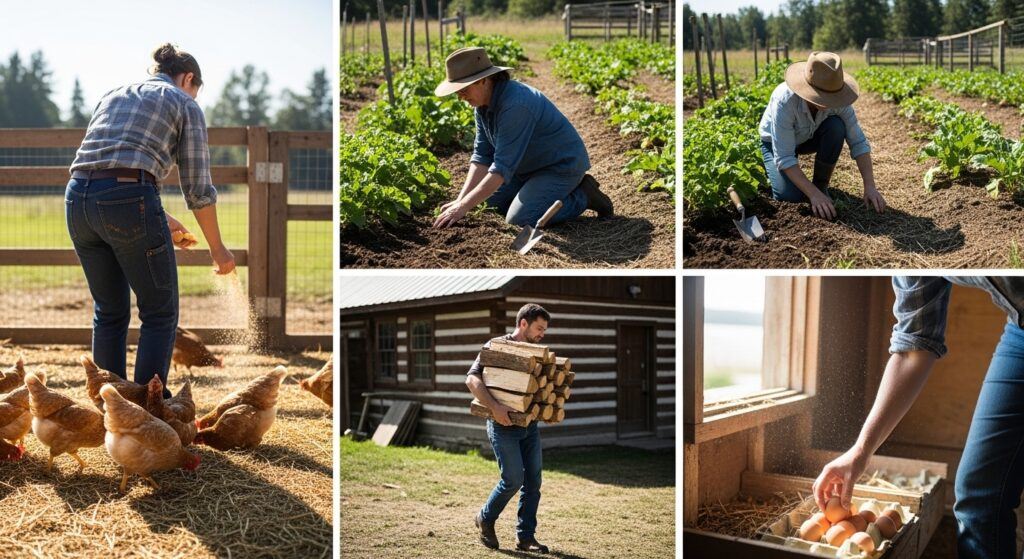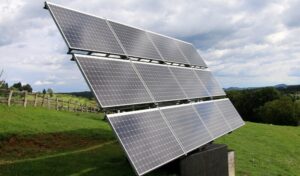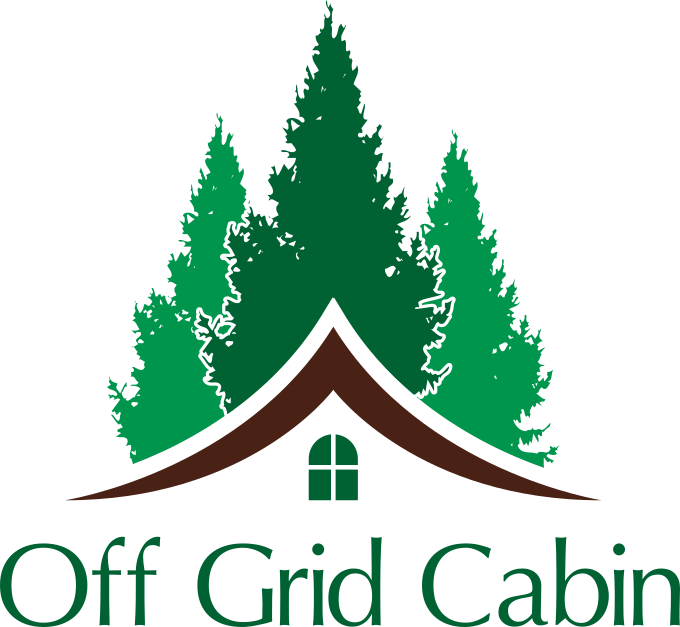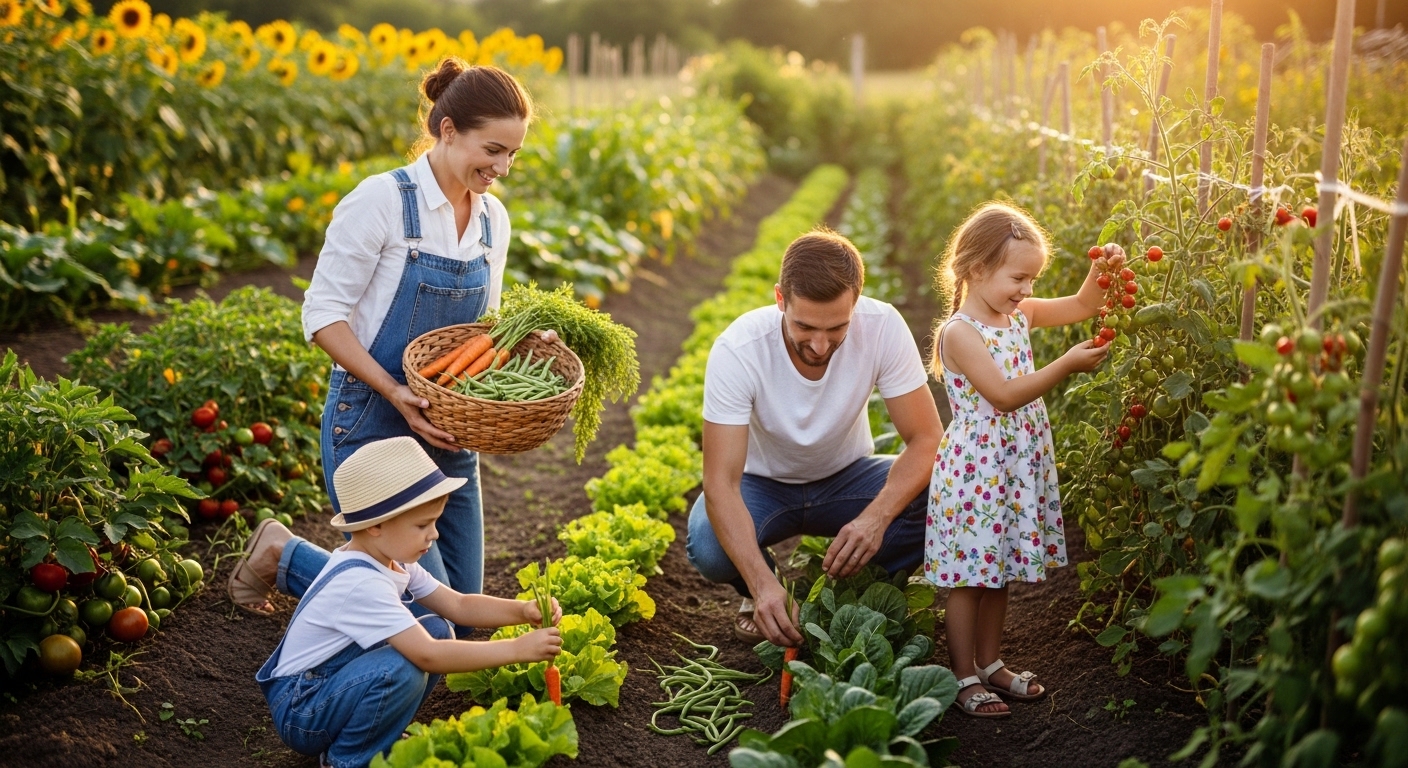Have you ever thought about homesteading—getting back to a simpler, more self-sufficient life?
Homesteading has seen a major resurgence in recent years. Economic uncertainty, growing concerns about food quality, rising utility costs, and even popular survival-style entertainment have encouraged many people to reconsider how—and where—they live.
Whatever your reason for exploring homesteading or off-grid living, you are not alone. But before taking the leap, it’s important to understand the realities behind some common misconceptions.
Below are key things every prospective homesteader should know before getting started.
If you’re new to this lifestyle, our guide to Off-Grid Living walks through what it really means to live independently from public utilities and how to decide if it’s the right fit for your goals.
Table of Contents
Land Isn’t Free Anymore
One of the biggest myths about homesteading is the idea of free land.
In 1862, the U.S. government introduced the Homestead Act, granting 160 acres of land to families willing to work and improve it. This act was revised several times and ultimately ended in 1976 with the introduction of the Federal Land Policy and Management Act.
Today, homesteading land must be purchased or leased. However, depending on how your homestead is structured, there may be tax advantages or deductions if it operates as a business.
Careful planning—and professional advice—can make land ownership more manageable than many people expect.
If you’re serious about exploring homesteading or off-grid living, learning from people who have already done it can shorten the learning curve and help you avoid costly mistakes.
How to Survive Off the Grid: From Backyard Homesteads to Bunkers (and Everything in Between)
Choosing the right property is one of the biggest decisions you’ll make, and our post Finding Our Off-Grid Cabin: The Beginning of Our Cabin Project shares what we looked for, what we found, and what we didn’t expect when buying rural land.
Homesteading Is Hard Work
If you’re under the impression that homesteading will be easy or stress-free, it’s important to reset expectations early.

This lifestyle requires consistent physical labor, problem-solving, and mental resilience. Animals need daily care, gardens don’t wait, and weather rarely cooperates on schedule.
That said, many homesteaders find this work deeply satisfying. You see the results of your effort directly—fresh food, preserved harvests, warm shelter, and growing independence. For many people, this kind of work feels far more meaningful than a traditional 9-to-5 job.
Many new homesteaders benefit from a practical, all-in-one reference, and The Homesteading Handbook walks through essential skills like food production, canning, keeping chickens, generating energy, and crafting a self-reliant lifestyle.
Many of the day-to-day realities of homesteading are tied to the structures you live and work in, and our Cabin Projects section documents the real repairs, upgrades, and lessons learned while improving an off-grid cabin.
There Are No Employer-Paid Benefits
Homesteading doesn’t come with built-in benefits.
There’s no employer-paid health plan, no pension, and no paid sick days. You’ll manage your own taxes, bookkeeping, and long-term planning. Time off often depends on whether animals are cared for and systems are running smoothly.
However, many homesteaders feel the trade-off is worth it. While extended vacations may be rare, the daily lifestyle itself often feels like freedom.
Understanding the Cost of Homesteading
The cost of starting a homestead varies widely.
Expenses depend on:
- Land price and location
- Equipment needs
- Infrastructure (housing, fencing, water, power)
- Animals and crops
- Whether the homestead is personal or commercial
Some homesteads start small with a few hundred dollars, while others require significant investment. Research each animal and crop carefully, and scale slowly. Starting modestly helps avoid unnecessary debt and burnout.
One area that often surprises new homesteaders is energy costs, and our Power & Energy resources explain how solar and alternative power systems can reduce long-term expenses off grid.
Technology Plays a Major Role in Modern Homesteading

Whether you are raising produce for your family or making a living from your homestead, you will still use technology in your everyday life.
If you are under the impression that cell phones and computers will no longer be needed, you will be surprised to learn that living the homestead life (sic) often requires the use of technology.
Technology has made homesteading easier and more productive.
Before technology, homesteaders had to rely on the farmer’s almanac or old wife’s tales for weather forecasts.
Farmers also had to have employees or a large family to harvest crops. Today, you can purchase tractors and farm equipment that can do the job of ten men in half the time.
Solar technology can also save you a significant amount of money by producing your own energy.
This energy helps make homesteading more sustainable and can even generate credits from your electric company.
If you want to get the most out of homesteading, embrace technology.
It will help you troubleshoot any problems and you can supplement your income online, if needed. No one can control mother-nature, but technology can help you work with and survive it.
Earning an Income While Homesteading
There are many ways to earn an income from homesteading. If you plan to become self-employed or earn a living from farming for the first time, meet with an accountant who can inform you of your responsibilities as a tax-payer.
An accountant who is familiar with farming will also be able to explain tax credits that may help you get started or continue running your farm.
There are many ways that living the homesteading life can result in your family making a good income.
Selling Items Your Homestead Produces
From year-to-year you will notice that the exact same crop will vary in yield and quality. It is a good idea to diversify your income in the event that one income stream fails.
Selling produce and products you make is a great way to earn a living for homesteaders.
You can sell items at your local farmer’s market, directly to grocery stores in your area, and online.
Selling Livestock
If you are comfortable with selling livestock and have the land for it, it can be quite lucrative. Cattle, goats, chickens, and pigs are common livestock.
Livestock is much more expensive to raise, but you stand to make a much greater profit from it.
You can sell young animals at auction to other farmers or sell mature livestock directly to processors. Milk, cheese, and other products that can be made from cow’s or goat’s milk can also be sold.
Some livestock, such as alpaca or sheep can be sheared for their roving and sold to textile mills.
If raising animals is part of your long-term plan, The New Livestock Farmer focuses on the business side of livestock, including ethical meat production, pricing, and selling animals responsibly.

Other options would include:
- Fresh produce
- Eggs
- Preserved foods
- Handmade goods
- Herbal or value-added products
These items can be sold at farmers’ markets, roadside stands, local stores, or online. Diversifying products helps protect income when crops or yields vary year to year.
Growing and preserving your own food is often the foundation of a successful homestead, and our Gardening & Greenhouse guides show how to produce food even in short growing seasons.
Blogging and Online Income for Homesteaders
Many modern homesteaders earn income online.
Blogging allows you to share knowledge about gardening, DIY projects, food preservation, animal care, and off-grid living—without expanding farm operations. Income may come from advertising, digital products, affiliate links, or teaching others what you’ve learned.
For some families, blogging and online education become the primary income source, with the homestead supporting the lifestyle rather than funding it.
Income from blogging often comes from ads, selling products online, and teaching others how to do the same thing you are doing successfully.
Is Homesteading Right for You?
Homesteading isn’t for everyone—but for those willing to work hard, adapt, and learn continuously, it can be deeply fulfilling.
Whether your goal is food security, independence, financial resilience, or a closer connection to the land, homesteading offers a path that blends challenge with reward.
For those drawn to traditional, hands-on knowledge, Country Wisdom & Know-How is a classic reference that covers everyday skills and practical knowledge for living closer to the land.
If you’re looking for reliable information as you get started, these off-grid books and resources helped shape our learning curve and avoid costly mistakes.
Disclosure:
Content on this site is for informational purposes only and reflects personal experience and research. Off-grid living laws and conditions vary by location, so readers should always verify local regulations before making decisions. Some links may be affiliate links, which help support this site at no additional cost to you.
Updated Feb 2026
© 2017 – 2026, Teresa. All rights reserved.


I found this article to be very helpful. Homesteading is not bad at all and I must say that it can be very interesting. I mean animals, plants etc, it can have a great impact on our life. I agree with you that it is expensive to start with but not impossible.
thanks for stopping by Dan, homesteading can be interesting for sure. It’s a different way of life from what most of us are used to.
Hey there! Thanks for this comprehensive look into homesteading. It has been something that I’ve been interested in doing since my hubby is going to inherit a good piece of land. How much acres do you think are needed for a sustainable family sized homestead? We have us and our daughter but might have some additions soon.
Thanks and have an awesome day!
Marlinda
Hi Marlinda so exciting for you. We have 10 acres, but I know people that live off grid on 5 acres and are able to sustain their family of 6 quite nicely on that.
Very interesting site overall. I myself have been staying in cabins before, but not as remote as yours. This has been very i eye opening about the cougars, and bears. This is not something my wife enjoys unless its a little more developed camp or park area. I want to learn more about those solar devices that keep several animals away. You link was not working, yet I can look on Amazon for these. Perhaps you could check the link or supply it after my comments? Good information about other off the grid products and proper things to make a nice cabin in that way. I may yet convince my wife to try thinking about this. thanks
Being remote is not for everyone for sure. Thanks for letting me know about the links for the solar devices, I have fixed them and here is a link below as well.
Solar Repellent
Wow i never knew there was so much to consider for homesteading. Is homesteading the same thing as living off the grid? If someone wanted to homestead should they have various things that they harvest or raise? For example, would it be a good idea to have both crops and cattle, or even more than 1 type of crop? Or do you think a living could be made by just having one like just chickens or cows or just corn? Is it possible to be self-sufficient on your homestead and not have to sell anything but harvest for your own family only? Or would there need to be some kind of income? I ask because I’ve seen shows about living off the grid and they make it seem like it is possible to live without any income source at all.
Living off grid is with no power, where as homesteading could be the same but not necessarily without power. As for homesteading and what to grow etc. You could raise animals and grow crops, that would depend on what you want. I think it is possible to be self sufficient but it will be a lot of work and would help to be a family. With us, it’s just two of us so we do need other income to help sustain us, but I certainly think its possible to do without. Trading your animals or growing your crops and selling the extra a farmers market.
I tell you what, the way things are going in this world, homesteading just looks more and more enticing. I’ve often thought about what it would be like to live off the grid though I see that it does involve a lot of work. I like how you laid it down on what homesteading entails such as what plants and animals to have, what it takes to get the land you want to homestead on, how to earn an income while living on a homestead, etc. Are there some states where it’s easier to homestead than others?
Thanks Brian, some states are easier than others to homestead. It would depend on what you are looking for.
From what I hear Arizona is the cheapest state, Montana has the best views and Alaska is the most remote.
Washington and Oregon are popular states for homesteading as well.